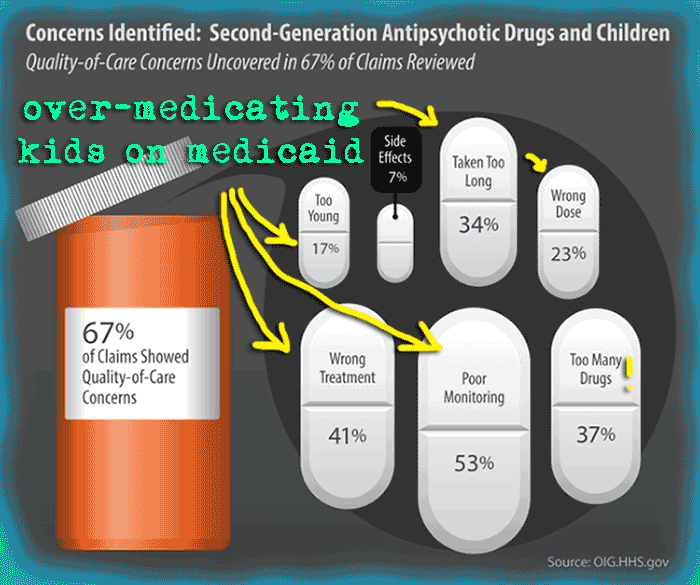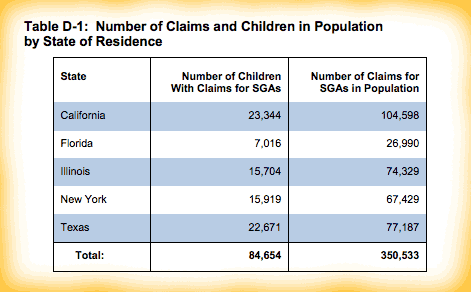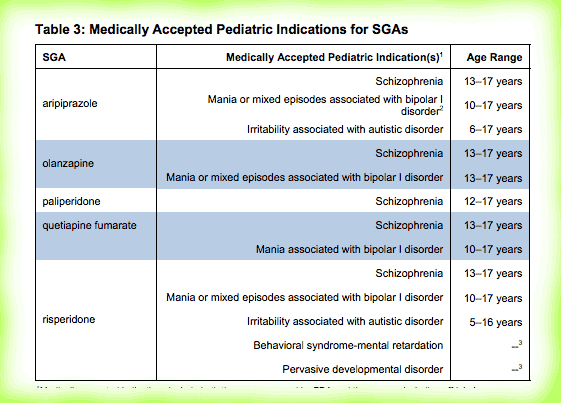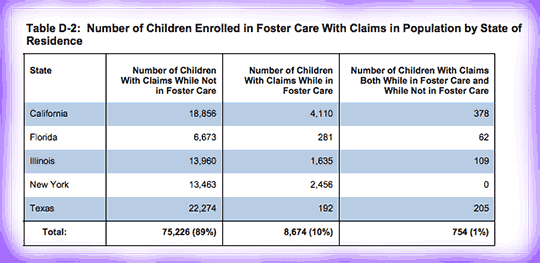ALARMING NEW FEDERAL REPORT ON DOCS OVER-PRESCRIBING POWERFUL ANTIPSYCHOTIC DRUGS TO CHILDREN ON MEDICAID
A new report from the US Department of Health and Human Services’ Office of Inspector General shines some light on the excessive use of antipsychotic drugs to treat poor children (many of them in foster care) on Medicaid.
Researchers requested records from 2011 on 687 claims in five states: California, Florida, Illinois, New York, and Texas. They received information on 485 of the requests (many of the other records were incomplete or nonexistent). These particular states were chosen because they comprised 39% of all Medicaid payments for antipsychotics.
These “second-generation antipsychotics” (SGAs) are often used to treat schizophrenia, bipolar disorder, and autism-related irritability. Because minimal clinical research has been completed on how the SGAs affect kids, and there are very specific age-ranges approved for use of the antipsychotics, many doctors prescribe these medications for conditions that are not considered medically accepted.
Thus, kids often receive the wrong treatment, are given a dangerous cocktail of psychotropic drugs, and experience severe side-effects (like suicidal thoughts, paranoia, and hallucinations) and other potentially problematic effects like weight gain, none of which are properly monitored.
In 67% of the claims, the researchers found what they call quality-of-care concerns. Just under half of claims showed two or more of these particular concerns.
A whopping 53% of cases were poorly monitored. Kids vital signs and blood pressure were not regularly tracked, they were not checked for involuntary movements, height and weight were not monitored, and doctors did not run lab work to check for liver and blood issues.
In 41% of kids’ records, there was either no explanation as to why the antipsychotics were prescribed, or they were prescribed for an inappropriate reason. In over one-third of cases, these drugs were prescribed to treat conditions listed on the medication’s FDA boxed warning. (An example of this would be prescribing an antipsychotic medication to a child with major depressive disorder, despite an FDA warning label that says the drug may cause suicidal thoughts in children with major depressive disorders).
Other distressing patterns included prescribing kids too many drugs at once (37%), keeping kids on the antipsychotics for too long (34%), giving the wrong dose (23%), prescribing to kids too young (17%), and negative side-effects (7%).
In one particular case, a child diagnosed with bipolar disorder was prescribed six psychotropic drugs at once. Three were antipsychotics. A vague mention of hallucinations was the only explanation for the heavy drugging. The 16-year-old suffered through insomnia, “paranoia, hostility, unstable mood, hallucinations, and suicidal thoughts” as well as significant weight gain, and swelling of the hands and feet. When the teen was taken off these drugs, the originally reported hallucinations vanished.
Only in 8% of the cases were kids’ prescribed these drugs for any of the medically accepted reasons. And of the five states, only New York restricted Medicaid coverage for these drugs outside of medically accepted reasons (unfortunately, 3,366 prescriptions were covered in violation of New York’s policy).
According to the report’s lead investigator, Michala Walker, antipsychotics “should only be used for a medically appropriate reason and, when they’re used, they must be very carefully managed to ensure safety and quality care.”
The report urges the Centers for Medicare and Medicaid Services (CMS) to partner with state medicaid programs to review how antipsychotics are prescribed to children, and to conduct regular reviews of the medical records of medicaid-covered kids prescribed the drugs, and to work with states to come up with ways to boost oversight. CMS has agreed with these three recommendations.
Karen de Sa, who has been doing some powerful investigative reporting on how and why California’s foster kids are so heavily medicated, also reported on this new data.





A link between anti-psychotic & SSRI drugs and violent crimes have long been established. The politicians’ in DC are aware of this problem. When advocacy groups push for legislation and regulations these politicians’ have access to reports that prove this beyond a shadow of a doubt. So, the next time DC tries to infringe upon your Second Amendment right by imposing gun restrictions, ask yourself why they’re not demanding restrictions on mood enhancing drugs. Who exactly are they representing?
The Alliance for Natural Health Website published the following: “The website SSRIstories . com has compiled a jaw-dropping list of school shootings, spree killings, murder attempts, and other violent actions, together with the particular antidepressant medication the perpetrator was using (or had just withdrawn from). In 2006, the peer-reviewed journal PloS Medicine published an article outlining a series of medico-legal cases involving antidepressants and violence. They note that many of the court cases appear not to have considered the possibility that a prescription drug may induce violence.”